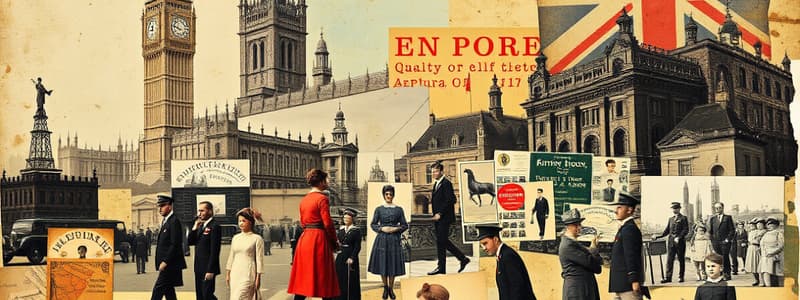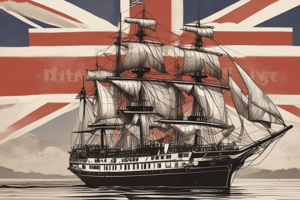Podcast
Questions and Answers
What were the significant factors contributing to Britain's high quality of life in 1901 compared to other countries?
What were the significant factors contributing to Britain's high quality of life in 1901 compared to other countries?
Britain was better fed, better clothed, healthier, and more educated than many other nations.
By 1901, how did Britain's industrial position compare to that of the USA, Germany, and Japan?
By 1901, how did Britain's industrial position compare to that of the USA, Germany, and Japan?
Britain was the richest country but faced increasing competition as the USA was producing more goods, and Germany and Japan were rapidly industrializing.
How did Britain's military strength in 1901 compare to that of other nations?
How did Britain's military strength in 1901 compare to that of other nations?
Britain had more battleships than the next two countries combined, but rival nations were rapidly increasing their military capacities.
What demographic changes occurred in Britain around 1901 regarding its population?
What demographic changes occurred in Britain around 1901 regarding its population?
What was the social structure of Britain's population in 1901 in terms of wealth distribution?
What was the social structure of Britain's population in 1901 in terms of wealth distribution?
What role did Queen Victoria's family connections play in Britain's international relations by 1901?
What role did Queen Victoria's family connections play in Britain's international relations by 1901?
In what ways was Britain’s vast empire significant during 1901?
In what ways was Britain’s vast empire significant during 1901?
How did the death of Queen Victoria in 1901 mark the end of an era for Britain?
How did the death of Queen Victoria in 1901 mark the end of an era for Britain?
Flashcards are hidden until you start studying
Study Notes
Life in Britain in 1901
- British citizens enjoyed a high quality of life, better in nutrition, clothing, health, and education compared to many global populations.
- Cities were vibrant marketplaces filled with diverse goods produced domestically or imported from the British Empire.
- The British Empire was the largest in history, encompassing over a quarter of the global population (approximately 450 million people).
Britain's Global Status
- By 1901, Britain had undergone the first industrial revolution and was recognized as the world's richest nation.
- Economic threats loomed as the USA produced more goods than Britain, with Germany and Japan rapidly advancing.
- Military competition was escalating, with Britain's naval strength surpassing that of its two closest rivals combined.
- Germany had one of the largest armies in Europe, while Japan, Germany, Russia, and the USA significantly expanded their naval capabilities.
Queen Victoria and Succession
- Queen Victoria reigned for 63 years and passed away on January 22, 1901; her son, Edward VII, ascended to the throne.
- The royal family had extensive connections with European monarchs, influencing diplomatic relations.
Demographics and Society
- Britain's population in 1901 was approximately 40 million, with about 80% residing in urban areas.
- Around 130,000 individuals from British colonies, particularly India, lived in the UK for work or education.
- Settlement patterns predominantly occurred in port cities such as London, Liverpool, and Cardiff.
Social Structure and Wealth Disparity
- The societal structure was divided: roughly 3% were affluent upper-class; a slightly higher percentage comprised the middle class (bankers, doctors, and managers); and the majority (working class) faced poverty.
- Wealthy individuals lived in luxury, often relying on income from investments and property, highlighting stark contrasts in living standards.
- Many working-class individuals struggled to afford basic necessities, often employed in arduous factory, mill, or shipyard jobs.
- Absence of state welfare programs meant that the poor and the sick had to cover their healthcare costs independently.
Studying That Suits You
Use AI to generate personalized quizzes and flashcards to suit your learning preferences.




